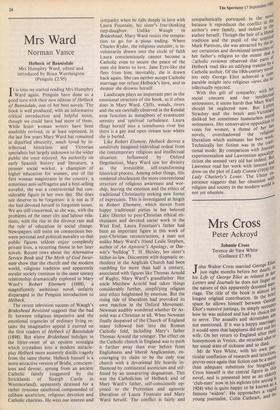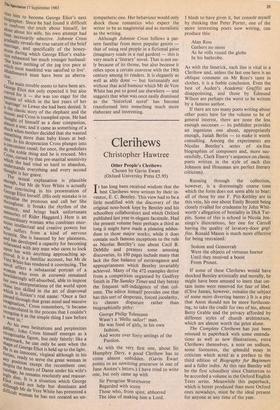Mrs Cross
Peter Ackroyd
Johnnie Cross Terence de Vere White (Gollancz £7.95)
john Walter Cross married George Eit°.1 J just eight months before her death; tar his Life of George Eliot as related ill Ile Letters and Journals he does not linger on the nature of this apparently downed °la! nage. The title of the book is almost longest original contribution. In the brlee space he allows himself between Ge°11„ Eliot's massive jottings, he simply rec°°`; how he was enlisted and had no choice it to serve. The assaults and skirmishes 9'' not mentioned. If it was a happy marclog,.e.: it would seem that happiness did not suit o!' wife. On her return to England after their honeymoon in Venice, she returned also to her usual state of sickness and so died. Mr de Vere White, with his own, Pan ticular conflation of research and intuition, proves once again that fiction can be a rrOte, than adequate substitute for biograPlik' Cross himself is the central figure in 1h!5 novel, and is presented here as an elderly 'club-man' now in his eighties (the setting las 1924) who is quite happy to be known as.d famous 'widow'. He approaches a vaP,1 young journalist, Colin Cathcart, and 1°' vites him to become George Eliot's next ib,it)graPher. Since he had found it difficult 'v. confront the truth about himself, let LaKine about his wife, his own attempt had ueen necessarily selective. Johnnie Cross graduallY reveals the true nature of the brief marriage, and specifically of the honey-
°on during which George Eliot's exalta- tion exhausted her much younger husband: 'She knew nothing of the jog trot pace at
.hich most mankind was satisfied to live'. middlemarch must have been an aberra- tion.
The main trouble seems to have been sex. -e°rge Eliot not only expected it but also craved for it — she was too eager for the Passion of which in the last years of her marriage, to Lewes she had been denied. It is the classic story of the elephant and the °louse: and Cross is trampled upon. He had th°ught of himself as a dear companion, almost a son; and it came as something of a when mother decided that she wanted shock tsOmething more than baby kisses at bed- 'hie. In his desperation Cross plunges into act convenient canal; for once, the gondoliers c° the noble thing and he is rescued. Mrs ,rciss, cursed by that pre-marital sensitivity winch she had tried so hard to abandon, .u,nderstands everything and every second `nought is her grave. „The sexual explanation is plausible Z°°gh, but Mr de Vere White is actually e convincing in his presentation of e°rge c Eliot herself. (His only mistake is to tiarlitalise the pronoun and call her She urcqghout. It breaks the rhythm of the sentene eineinoriee,s afnd brings back unfortunate o Rider Haggard.) Here is an Xtraordinary woman who combines enor- will,cius intellectual and creative powers but , "0 suffers from a kind of nervous anysteria. She is haunted by her plainness, i1151 has developed a capacity for becoming !ItaInated with any man who cares to look urion her with anything approaching ap- Z°val. It is a familiar account, but Mr de „ ere White has rendered it convincing. The nwovet offers a substantial portrait of a hvewilderingly L "Ian who even in extremis remained r self-absorbed, able to impose tite (win interpretations of the world upon .0.se less skilled in the art of disavowal h is fiction's real name: 'Once a fact ;_assedthrough that great mind and massive 1:roiagination,' Cross remembers, 'it became `"
rn_convoluted in the process that I couldn't nise it
It went as the simple thing 1 saw before in., getAt.s his own hesitations and perplexities teener, John Cross himself emerges as a w,,ottermarc'enisable figure, but only faintly: like a sht. A, he can only be seen when the LT,I;ie of George Eliot is held up to the light. !s an innocent, virginal although in his y
au..rttes, ready to serve the great woman in 11s PDiteosition except the recumbent one; the
Intel hours of Dante under his wife's ,.,.. in i age, he remains resolutely and reassur- YIt is a situation which George alth°,t c°111d not help but dominate and cliti • 'ugh Mr de Vere White has presented a 'cult woman he has not created an un-
sympathetic one. Her behaviour would only shock those romantics who expect the writer to be as magisterial and as moralistic as the writing.
Although Johnnie Cross follows a pat- tern familiar from more popular genres — that of using real people in a fictional guise (imaginary toads in a real garden) — this is very much a 'literary' novel. That is not on- ly because of its theme, but also because it relies upon a certain converse with the 19th century among its readers. It is elegantly as well as ably done — but fortunately not without that acid humour which Mr de Vere White has put to good use elsewhere — and suggests that what was once easily dismissed as the 'historical novel' has become transformed into something much more elaborate and interesting.







































 Previous page
Previous page